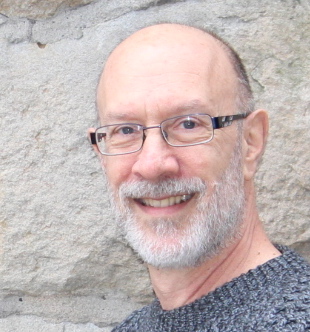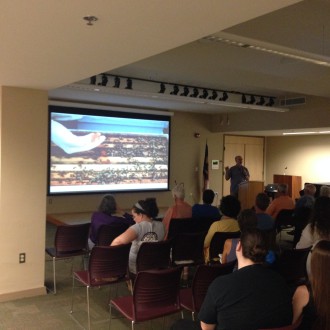As part of Bee City U.S.A.’s pollinator week events, author, biologist and beekeeper Mark Winston spoke before a crowd gathered in the Lord Auditorium of Pack Memorial Library on Wednesday, June 17, in a presentation called “Value or Values? Audacious Ideas for the Future of Beekeeping.”
The event, which served as the keynote address for a week of pollination-promoting activities, offered an existential and self-reflective narrative on the experience of beekeeping along with a critique of conventional environmental practices, which often cause great harm to bees and other pollinators.
Winston opened his presentation with a passage from his book, Bee Time: Lessons From the Hive, which revealed a deeper connection with bees than his scientific background might imply. Winston is an apiarist who has spent several years studying and promoting bees and pollination.
During his remarks, Winston offered his experiences with bees from a scientific standpoint while also making connections between bees, art and a range of innately human experiences. Winston drew a connection between bees and his own work with Simon Fraser University’s Center for Dialogue by saying that creating the connections necessary for dialogue is very similar to entering an apiary.
Winston said that science, when done well, can inform our understanding and enjoyment of the natural world and increase our ability to manage it. He used this idea to question our current practices of beekeeping and chemical use and to advocate for increased protections for bee populations. In discussing bees, he explained that bees are a feral organism, perhaps one of the most heavily utilized in agriculture, and that they essentially remain unaltered from their natural existence.
The presentation included a number of facts designed to orient attendees to the magnitude of the services that bees provide, while also highlighting the challenges that bees face. Winston stated that 67 percent of bee hives in the United States — some 1.6 million — are moved to California annually to support almond orchards. He also pointed out that the United States utilizes 1.2 billion pounds of pesticides annually, which he and other bee experts believe jeopardize bee colonies.
Ultimately, Winston advocated for an approach that better accounted for the needs of bees through reduced chemical use in pest management and through more sustainable farming practices. He concluded that alignments with sustainable and organic farming practices and efforts like the Slow Food movement will ultimately contribute to the survival of the bees.
For more information on Bee City U.S.A.’s Pollination Celebration week of events visit their website.





Enjoyed the comments of this article.. My biggest problem was black bears – out of a 500 plus colony operation – we had 65 hives destoried – the bears are smart – they knock the hives away from there stand location – in the pawing and hitting the bees tend to try and escape with most flying back to where the hive use to sit which allows less bees becoming defensive against the bear. Another pest was shunks which came in after dark – knowing the bees will not fly at night.. They scratch the front of the hive, causing the bees to come down into the hive opening on the bottom board. Next they paw them out on to the ground and eat the bees like a chicken eating corn… A mama shunk and her babies can eat a tea cup full each night and after a week it greatly weakens the hive. Lucky for us – pesticides was not a big problem. I personally believe microwave towers emitting electrical pluses has caused much to deplete bee populations as noted in recent years. Once again this is my opinion…